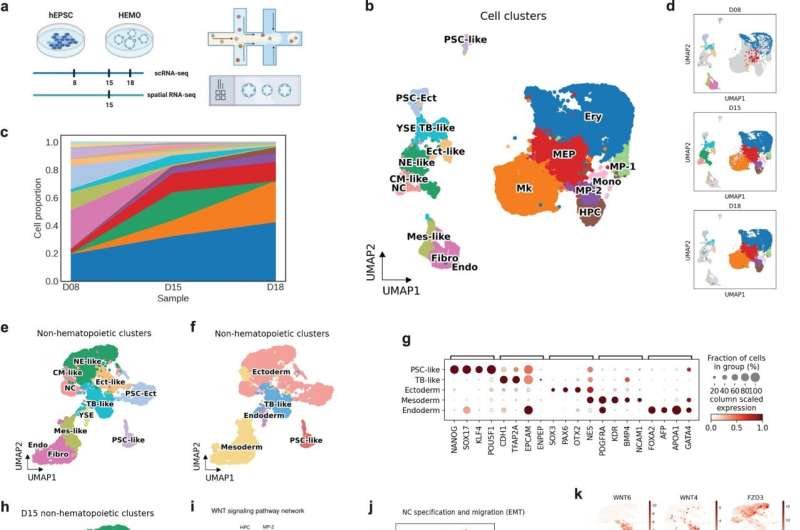This article has been reviewed according to Science X's editorial process and policies. Editors have highlighted the following attributes while ensuring the content's credibility:
fact-checked
trusted source
proofread
Researchers develop a robust platform to generate cells to enhance cancer immunotherapy efficacy

A joint research team has used stem cells to generate human immune cells for application in cancer immunotherapy. By replicating the natural process through which our bodies generate immune cells, this breakthrough platform is expected to significantly enhance cancer-targeting efficacy.
The team's findings were published in Signal Transduction and Targeted Therapy.
Cancer immunotherapy has advanced patient treatment over the past decade. However, a major obstacle has been the inadequate source of immune cells. In many cases, immune cells from cancer patients were mutated or depleted by chemotherapy, making them ineffective in fighting cancer cells. Hence, it was crucial to establish a platform for generating immune cells to recognize and attack cancer cells in the body.
With powerful self-renewal and differentiation abilities, stem cells are considered a robust source of immune cells. Currently, researchers use genetic modification techniques, such as lentiviral transduction of transcription factors, to generate immune cells from human stem cells, which poses a safety concern for patient use, for example, a subsequent oncogenic event by virus integration in the genome.
Consequently, there is an urgent need to generate immune cells without genetic modification for application in cancer immunotherapy. To address this challenge, it is important to allow stem cells to follow the natural pathway of making immune cells.
By employing a mixture of growth factors similar to those used during embryonic development, immune cells can be derived from stem cells through the formation of embryonic tissues in vitro.
In this study, the research team, from the LKS Faculty of Medicine, the University of Hong Kong (HKUMed), and The Hong Kong University of Science and Technology (HKUST), advanced this approach by successfully generating embryonic tissues from human stem cells, thereby establishing a novel platform to robustly generate immune cells without genetic modification.
The research team used special types of stem cells, called human expanded potential stem cells, to generate immune cells in vitro. These stem cells have unique advantages over conventional induced pluripotent stem cells in terms of their potential to differentiate into any type of tissue. To mimic the natural process of human embryo development, the team applied a mixture of growth factors used in embryos in vitro.
By studying gene expression, the team discovered that the embryonic tissues they created from stem cells closely resemble human fetal samples. They developed a new approach called a 'spatial transcriptomics algorithm' to precisely analyze the individual cells and gene expression from various samples, such as patient materials.
The findings indicate that the new platform can faithfully replicate the natural process by which the body generates immune cells. This could help clinicians in their diagnoses and prognoses of patients.
"The joint research team successfully established a new and robust platform for generating functional immune cells, the first time from human expanded potential stem cells. This approach will significantly enhance the efficacy and accessibility of cancer immunotherapy. The team is already working on a strategy to further enhance the cancer-targeting efficacy of immune cells, focusing on liver cancer, which remains one of the most prevalent cancers in Hong Kong," said Dr. Rio Sugimura, Assistant Professor, School of Biomedical Sciences, HKUMed, the lead author of the study.
The aim of the clinical translation of this research is the large-scale production of immune cells and the induction of chimeric antigen receptors (CAR-T cells).
The research team expects this breakthrough to open new possibilities for providing a sustainable and safe source of immune cells that can be used in cancer treatment, benefiting patients with various types of cancer.
More information: Yiming Chao et al, Organoid-based single-cell spatiotemporal gene expression landscape of human embryonic development and hematopoiesis, Signal Transduction and Targeted Therapy (2023). DOI: 10.1038/s41392-023-01455-y



















